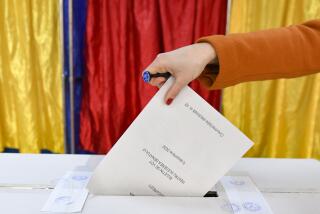1 Billion Votes, and Counting
When U.S. voters first went to the polls to elect a president, in 1789, they were conducting an unproven experiment. The rest of the world, if it noticed at all, looked on this novel way of choosing leaders with a combination of bemusement, skepticism and downright hostility.
In contrast, this November, when Americans head to the polls, other countries will not only be watching closely, many will have already been down the increasingly well-trodden path to the ballot box themselves: More than 60 countries will have already held national polls or referendums during 2004, and by year’s end more than a dozen will follow. By the time all the ballots are counted, well over 1 billion votes will have been cast worldwide -- a global record.
But what does this all mean for democracy? On the face of it, so many elections indicate a pretty healthy prognosis -- after all, as recently as 25 years ago only a minority of the world’s countries held multi-party elections, while today about 140 do so. But closer scrutiny reveals a host of problems: Many of those countries are not democratic by any other measure, there is growing voter disillusionment as newly democratic countries struggle to deliver on promises of peace and prosperity, and there are fears that elections in relatively poor and war-torn countries may exacerbate conflicts rather than resolve them.
Indeed, in most countries of the former Soviet Union and the Arab Middle East, as well as some parts of Africa and Asia, nearly all the broader hallmarks of democracy -- a free press, a vigorous opposition, a vibrant civil society, an independent judiciary, protections for minorities and so on -- are still largely absent. In this context, elections, when they occur, are largely pro forma exercises that seek to help legitimize the incumbents rather than hold them accountable to the electorate.
High expectations of what democracy could deliver on security, jobs, healthcare, housing have more often than not been dashed, leaving the public resigned and angry. Across Latin America, for instance, elected governments have been brought down by angry street protesters in recent years. A U.N. report showed that, following nearly two decades of democratic government characterized by relatively dismal growth and persistent inequality, nearly one in two Latin Americans would consider a return to authoritarian rule if it guaranteed greater economic benefits. Even in South Africa, only three in every four registered voters turned up to vote this year, well down from the nine in 10 who waited in line for hours to help end apartheid a decade earlier. But turnout there remains higher than in many other established democracies, including the U.S., and those who did vote reelected the ruling African National Congress in a landslide. And despite the fact that some leaders’ approval ratings hover near the single digits, the one Latin American coup of recent years -- against President Hugo Chavez in Venezuela -- was quickly overturned, and no others have been attempted, suggesting that what the public really wants is democracy and development rather than a return to dictatorship.
A final, persistent concern is whether elections are even appropriate for very poor states, particularly those emerging from conflict, given the demagoguery and jostling for position they inevitably encourage. But the bottom line is, as has been clear in both Afghanistan and Iraq, elections are the only viable route for governments to secure any long-term legitimacy. And although the empirical evidence is ambiguous, skeptics can take heart from the example of Mozambique. In December the southern African nation, which less than 15 years ago was by some measures the most destitute in the world after a brutal and bitter civil war, will hold its third democratic election as incumbent President Joaquim Chissano steps down and bequeaths an orderly political succession and a stable country enjoying near double-digit growth rates.
The bottom line is that democracy is not an event, but a process. Elections may not be sufficient to create democracy, but they remain a necessary foundation on which one can be built. And the fact that more people will have cast a vote in 2004 than lived on the planet when George Washington became the world’s first democratically elected president is one in which he and his fellow founding fathers would surely have taken some justifiable pride.
More to Read
Sign up for Essential California
The most important California stories and recommendations in your inbox every morning.
You may occasionally receive promotional content from the Los Angeles Times.










